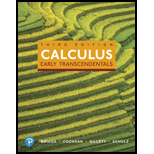
Comparison tests Use the Comparison Test or the Limit Comparison Test to determine whether the following series converge.
36.
Want to see the full answer?
Check out a sample textbook solution
Chapter 10 Solutions
Calculus: Early Transcendentals (3rd Edition)
Additional Math Textbook Solutions
Precalculus Enhanced with Graphing Utilities (7th Edition)
Thomas' Calculus: Early Transcendentals (14th Edition)
Precalculus
University Calculus: Early Transcendentals (3rd Edition)
Calculus and Its Applications (11th Edition)
- 00 Does the seriesE(- 1n+12+n° n4 converge absolutely, converge conditionally, or diverge? n= 1 Choose the correct answer below and, if necessary, fill in the answer box to complete your choice. O A. The series converges absolutely per the Comparison Test with > 00 n4 n= 1 B. The series diverges because the limit used in the Ratio Test is not less than or equal to 1. OC. The series converges conditionally per the Alternating Series Test and the Comparison Test with n= 1 D. The series converges absolutely because the limit used in the nth-Term Test is E. The series diverges because the limit used in the nth-Term Test does not exist. O F. The series converges conditionally per the Alternating Series Test and because the limit used in the Ratio Test isarrow_forwardI need help on this. Thank youarrow_forwardHow do you use the direct comparison test and the limit comparison test to compare these two series?arrow_forward
- n3 Use the limit comparison test with the p-series to determine whether S 2n5 – 4n – 1 converges or diverges. n=2 The limit comparison test cannot be applied to these two series. S converges. S diverges. The test is inconclusive.arrow_forwardUse any method to determine if the series converges or diverges. Give reasons for your answer. (n + 4)(n+6) n! Σ n=1 Select the correct choice below and fill in the answer box to complete your choice. O A. The series diverges because the limit used in the nth-Term Test is OB. The series diverges because the limit used in the Ratio Test is. OC. The series converges because the limit used in the nth-Term Test is O D. The series converges because the limit used in the Ratio Test isarrow_forwardDetermine if the series converges or diverges. Give a reason for your answer. ∞ Σ n=1 4 6 + Inn Does the series converge or diverge? A. The limit comparison test with B. The limit comparison test with ∞ D. The limit comparison test with n=1 ∞ n=1 ∞ n=1 1 - shows that the series diverges. n n=1 -| 2n OC. The limit comparison test with shows that the series converges. 1 n shows that the series diverges. 1 2n shows that the series converges.arrow_forward
- choices: a. true b. false c. others (specify) 1. Stationary series are series with roughly horizontal with constant variance. 2.A non-stationary series the ACF drops to zero quickly. 3. The PACF of the stationary series is decaying exponentially,arrow_forwardHelp me fast so that I will give Upvote.arrow_forwarddetermine whether the series converges or diverges, using either the Comparison Test or Limit Comparison Test.arrow_forward
- Binomial seriesa. Find the first four nonzero terms of the binomial series centered at 0 for the given function.b. Use the first four terms of the series to approximate the given quantity.arrow_forwardUse any method to determine if the series converges or diverges. Give reasons for your answer. 00 (n+4)! n=1 4/nl4 Σ Select the correct choice below and fill in the answer box to complete your choice. OA. The series converges because the limit used in the nth-Term Test is OB. The series converges because the limit used in the Ratio Test is OC. The series diverges because the limit used in the nth-Term Test is OD. The series diverges because the limit used in the Ratio Test is Next qarrow_forward05* Let p, q> 0. Find the relation of p and q so that the following series is convergent. p>1 and p=1,q>1 p1 p1 and p=1, q<1 8 n=1 1 n²(Inn)arrow_forward
 Calculus: Early TranscendentalsCalculusISBN:9781285741550Author:James StewartPublisher:Cengage Learning
Calculus: Early TranscendentalsCalculusISBN:9781285741550Author:James StewartPublisher:Cengage Learning Thomas' Calculus (14th Edition)CalculusISBN:9780134438986Author:Joel R. Hass, Christopher E. Heil, Maurice D. WeirPublisher:PEARSON
Thomas' Calculus (14th Edition)CalculusISBN:9780134438986Author:Joel R. Hass, Christopher E. Heil, Maurice D. WeirPublisher:PEARSON Calculus: Early Transcendentals (3rd Edition)CalculusISBN:9780134763644Author:William L. Briggs, Lyle Cochran, Bernard Gillett, Eric SchulzPublisher:PEARSON
Calculus: Early Transcendentals (3rd Edition)CalculusISBN:9780134763644Author:William L. Briggs, Lyle Cochran, Bernard Gillett, Eric SchulzPublisher:PEARSON Calculus: Early TranscendentalsCalculusISBN:9781319050740Author:Jon Rogawski, Colin Adams, Robert FranzosaPublisher:W. H. Freeman
Calculus: Early TranscendentalsCalculusISBN:9781319050740Author:Jon Rogawski, Colin Adams, Robert FranzosaPublisher:W. H. Freeman
 Calculus: Early Transcendental FunctionsCalculusISBN:9781337552516Author:Ron Larson, Bruce H. EdwardsPublisher:Cengage Learning
Calculus: Early Transcendental FunctionsCalculusISBN:9781337552516Author:Ron Larson, Bruce H. EdwardsPublisher:Cengage Learning





